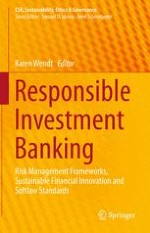2015 | OriginalPaper | Buchkapitel
10 Years’ Equator Principles: A Critical Appraisal
verfasst von : Manuel Wörsdörfer
Erschienen in: Responsible Investment Banking
Aktivieren Sie unsere intelligente Suche, um passende Fachinhalte oder Patente zu finden.
Wählen Sie Textabschnitte aus um mit Künstlicher Intelligenz passenden Patente zu finden. powered by
Markieren Sie Textabschnitte, um KI-gestützt weitere passende Inhalte zu finden. powered by
